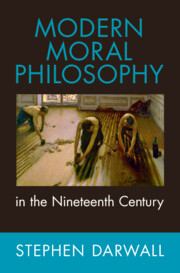Book contents
- Modern Moral Philosophy in the Nineteenth Century
- Modern Moral Philosophy in the Nineteenth Century
- Copyright page
- Dedication
- Contents
- Preface
- Acknowledgments
- Introduction
- Part I Post-Kantian German Idealism
- Part II Morality Critique
- Part III Sources of Naturalistic Utilitarianism
- Chapter 6 Early Modern Prologue
- Chapter 7 Bentham
- Chapter 8 Mill
- Part IV Victorian Anti-naturalism
- References
- Index
Chapter 8 - Mill
from Part III - Sources of Naturalistic Utilitarianism
Published online by Cambridge University Press: 15 November 2025
- Modern Moral Philosophy in the Nineteenth Century
- Modern Moral Philosophy in the Nineteenth Century
- Copyright page
- Dedication
- Contents
- Preface
- Acknowledgments
- Introduction
- Part I Post-Kantian German Idealism
- Part II Morality Critique
- Part III Sources of Naturalistic Utilitarianism
- Chapter 6 Early Modern Prologue
- Chapter 7 Bentham
- Chapter 8 Mill
- Part IV Victorian Anti-naturalism
- References
- Index
Summary
Although Mill learned Bentham’s utilitarianism literally at his father James Mill’s knee, Mill’s own version of utilitarianism departed from Bentham’s at key points. When Mill tried to live Bentham’s utilitarian doctrine as a youth, he was sent into a deep depression from which he was saved by reading the Romantic poetry and a romantic relationship with Harriet Taylor. This led him to reject Bentham’s “quantitative hedonism” in favor of a “qualitative hedonism” that emphasized intrinsic differences between different kinds of pleasures and held that some pleasures are “higher,” and therefore more valuable, than others. Here Mill’s view recalls Aristotle’s that pleasures resulting from exercising higher, distinctively human faculties and sensibilities are intrinsically better. Unlike Aristotle, however, Mill persisted in holding that his view is a version of hedonism, defended on nonteleological, empirical naturalist grounds. A second important departure from Bentham, was Mill’s holding that the deontic ideas of moral right and wrong are conceptually connected to accountability. This made him a “modern moral philosopher” by Anscombe’s definition and led him to defend, on these grounds, a utilitarian theory of rights and justice as well as a version of utilitarianism that was more like rule utilitarianism than act utilitarianism.
Keywords
Information
- Type
- Chapter
- Information
- Modern Moral Philosophy in the Nineteenth Century , pp. 222 - 238Publisher: Cambridge University PressPrint publication year: 2025
